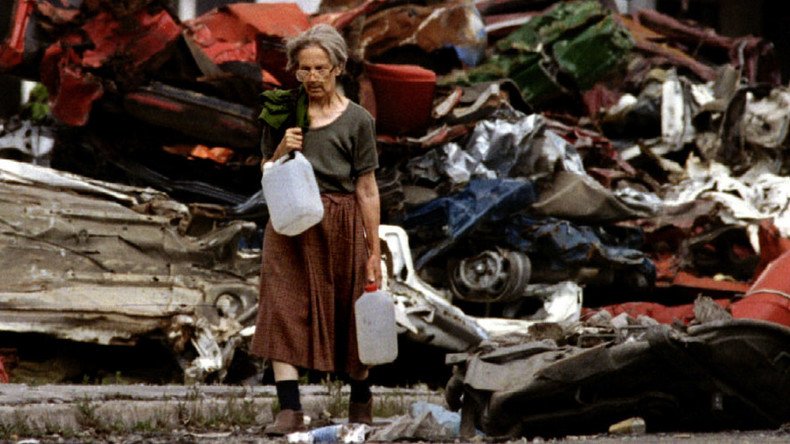From Sarajevo to Madaya: Starvation as propaganda

The sudden interest of Western media and diplomats in the Syrian city of Madaya has very little to do with the thousands of purportedly starving civilians – and everything to do with propaganda in a war that is not going the way Western capitals wanted.
For the past two weeks, first the Western-backed Syrian “activists” and then the mainstream media reporting their every rumor as gospel truth, began spreading stories about the “Assad regime” deliberately starving some 40,000 civilians inside Madaya, a former resort town 25 miles northwest of Damascus. Sordid stories splashed across the front pages of the Anglophone press and social media, claiming the government in Damascus was deliberately withholding food from innocent civilians “for months.”
In truth, the last convoy of food to reach Madaya was promptly seized by the anti-government rebels holding the town. The rebels have been selling the looted food at exorbitant prices, to the few locals who could still afford to buy. One of the residents spoke to RT of $30 for a kilo of rice; it was even worse, it turned out, with prices running as high as $250.
It's worse than the rumours: #madaya civilians say rebels charged 100,000 SP ($250) for kilogram of rice pic.twitter.com/HhvQ6Inbg4
— Murad Gazdiev (@MuradoRT) January 11, 2016So, it wasn’t the demonized Syrian President Bashar al-Assad personally overseeing the starving-out of Madaya, as one might think from the media coverage – but the very same “democratic moderates” backed by the West, who invented the narrative about the “walking skeletons of Madaya” and fed it to the gullible press.
One would imagine that now that food has been delivered, the false narrative would be exposed. Not so: the rebels and their backers are doubling down, using the story of Madaya to push for more intervention in the Syrian civil war.
After first food reaches #Madaya in months, UN just said over 400 people are on the brink of death in need of immediate medical evacuation
— Samantha Power (@AmbassadorPower) January 12, 2016All of this is striking a personal note for me. Before there was Madaya, there was Sarajevo, Bosnia, circa 1992. Two months into the civil war, the city was without food, running water or heat, often under artillery fire. There were no pigeons, cats or dogs around, and we made do with spoiling grain and whatever herbs we could pick from the parks. When food relief finally came, the military rations (MREs) so despised by US troops became a delicacy to be cherished.
But the delivery of food spoiled the plans of political players who banked on the starvation crisis to leverage foreign military intervention. Unable to fight and win the war with cannons, they turned to cameras, using the suffering of their own civilians as a bargaining chip with the “international community.” Time and again, like clockwork, utilities repaired by UN-aided crews would mysteriously break down and food deliveries would cease whenever peace talks were about to begin. When it became impossible to fool the Western reporters, however eager to further their careers by peddling atrocity pornography, the officials would invent another crisis in a remote part of the country. By the time any journalist could get there, the story was already old and firmly established in the minds of the public.
The influx of food, blankets and other materials intended for civilians enabled the regime to raise an army. We knew some of the supplies would be seized, but it was only when we saw the UN directly distributing food to refugees that we realized we were getting maybe a third of the intended rations, if that. Later on, even that dried up; entire convoys were simply directed to government warehouses, where officials and officers could help themselves, while the people they “protected” had to pay black market prices with whatever hard currency they could scrounge by selling off their possessions.
Meanwhile, a cynical narrative was pushed on the population that the corrupt, uncaring West was neglecting them by not sending enough, or sending spoiled surplus they would otherwise discard. That narrative took hold to such an extent that years later, a group of artists mocked UN aid by erecting a “thank-you” monument to the “international community” in the shape of canned beef.
.@HRW spoke to several ppl inside #Madaya. Suffering shows a need for concerted international action to deliver aid https://t.co/NlVik4Dirt
— Hadeel Al-Shalchi (@hadeelalsh) January 11, 2016The story of “starving Madaya” is but the latest arrow from the propaganda quiver I recognize from Bosnia. There, too, the West fomented civil war by encouraging one faction to reject the democratic process in favor of war, promising support that only came years later, and on terms and conditions of the West’s choosing. Another faction was blamed for everything, accused of atrocities, and outright demonized.
In the case of Syria, the government of President Assad was accused of everything from mass rapes to using chemical weapons. When actual evidence for these claims failed to materialize, the usual suspects resorted to the refrain of “barrel bombs,” because improvised water heaters filled with shrapnel are clearly more deadly than US-made missiles supplied to the “democratic moderate opposition.”
What else should one expect, though, from people who practically aided the rise of Islamic State in order to further the cause of “Assad must go”? In a fantasy world they inhabit, only their obsessions count. In the real world, however, other people get a vote too.
What gives me hope is that years ago, in Bosnia, such lies could win because there was no alternative to the media megaphone of the West. Today, there is.
By Nebojsa Malic, for RT
The statements, views and opinions expressed in this column are solely those of the author and do not necessarily represent those of RT.












